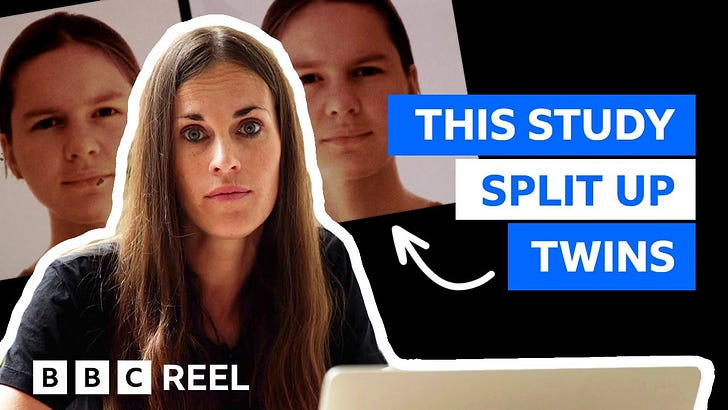What identical twins tell us about how our genes shape us
A New York adoption agency deliberately split up infant twins in the 1960s as part of a controversial study.
At the start of the year I interviewed a very interesting scientist called Nancy Segal. I first spoke to her a few months earlier for a piece I was looking into on bidirectional parenting - on how our children shape us. When we spoke, she told me about her other project - how she had tracked down dozens of twins who had been part of a controversial twin study and how a New York adoption agency deliberately split up infant twins in the 1960s as part of a controversial study.
I had heard of this study before but not in the depth her research took, looking at the inns and outs of exactly what these researchers set out to discover, and why it was flawed from the beginning. As I’m fascinated by nature vs nurture research, my filmmaker alarm bells went off and I knew what my next project would be.
Over the course of the next few months I reached out to some of the twins who had never before spoken on camera, as well as one of the original researchers, to see if they would share their story. In a combined TV, digital and text commission, I made the following half hour documentary (below) as well as this longread text piece.
I also met the most lovely identical twins in London - who grew up together and both ended up becoming police officers. Now they even live together (one has identical twin daughters herself). I met with them to get an understanding of the unique bond twins have - which the separated twins never had a chance to develop in the same way.
The reason I want to share it in this newsletter is because it brings up so many interesting questions about how powerful our genes are in shaping us and our children. Of course, it doesn’t mean our genes determine our fate, instead they predispose us to certain behaviour, for so much more than was originally believed. For parents, it’s also a little reassuring, because two children raised in the same home can behave in completely different ways - meaning so much parenting advice is flawed from the outset. As one scientist, Danielle Dick, author of The Child Code and a geneticist at Virginia Commonwealth University, told me last year, "it means that different parenting strategies actually work better (or worse) for different types of kids."
A few months earlier (and before I knew which twins were willing to talk) I also made a much shorter explainer - which you can see below if you want a brief overview of this fascinating research.
My book The Motherhood Complex is out now.
It’s available on Hive, Waterstones, Foyles or Amazon and all other stores. It’s also on e-book and audiobook. Read it? I would love to know what you think, or even better, leave me an Amazon review (you can do this regardless of where it was bought)- this really helps first time authors like me. Not in the UK? Free shipping abroad here.
Questions or comments? You can reply to this post or I’m on Twitter, Facebook and Instagram.



